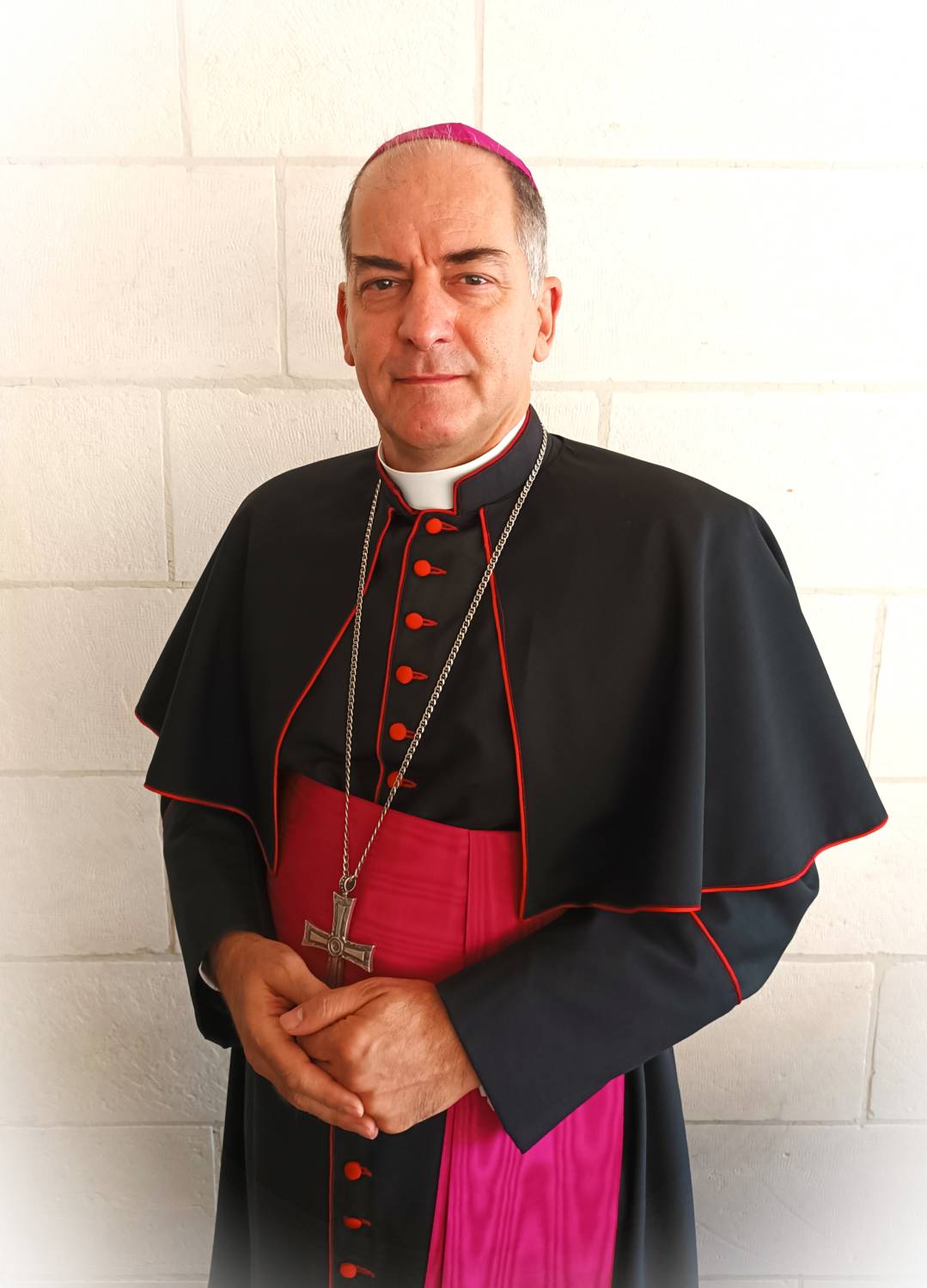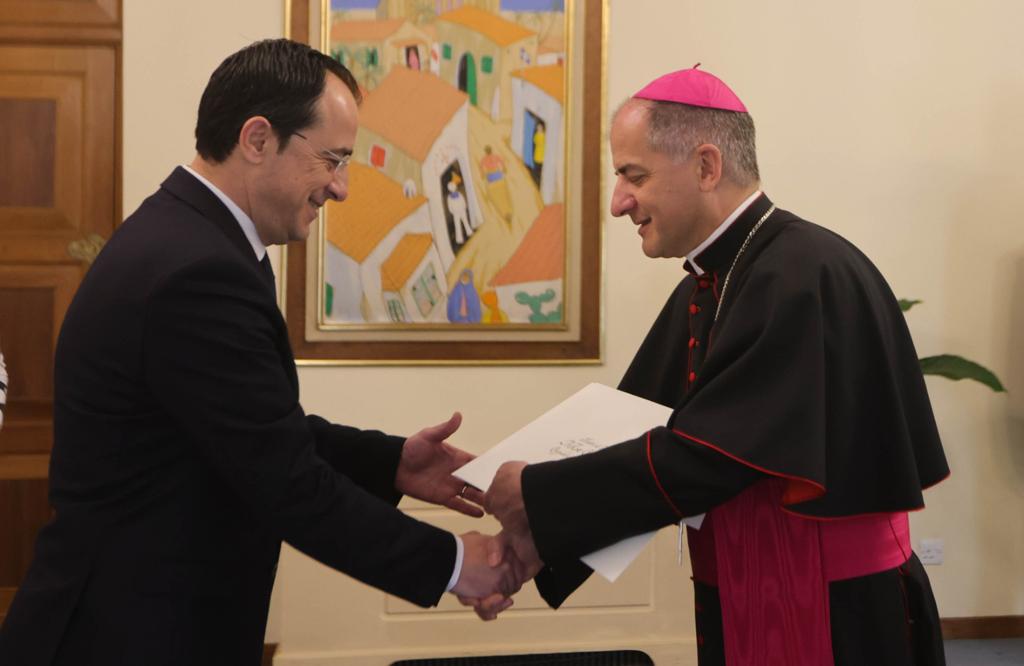Relations between the Vatican and Cyprus are warming, with the two small countries fostering connections that surpass mere ecclesiastical cooperation. The consecration of an Apostolic Nuncio in Nicosia, essentially an ecclesiastical diplomat, in February of last year, has further strengthened their ties.
In a discussion with Phileleftheros and in-cyprus, Archbishop Giovanni Pietro Dal Toso elaborates on the bonds uniting Cyprus and the Vatican.
He depicts Cyprus as a bridge linking Europe with the Eastern realms. According to Archbishop Dal Toso, this vision is encapsulated in a distinctive programme that enjoys Vatican participation and seeks to cultivate interfaith dialogue within Cyprus. “Representatives from the Orthodox Church, the Catholic Church (both Maronite and Latin communities), and Islam, have been talking to foster mutual understanding and avoid conflicts,” he says.
He also touches upon the challenges facing the Catholic Church and the Christian community and answers on what the Vatican is doing to achieve justice for sexual abuse victims.
Interview with Xenia Tourki and Stelios Marathovouniotis.
What are the relations of the Vatican with the Republic of Cyprus? Apart from religious matters, is there cooperation in other areas?
In recent months, we celebrated 50 years of diplomatic relations between the Holy See and the Republic of Cyprus. The Holy See maintains such relations with more than 180 countries worldwide, and the aim is twofold: to promote human dignity and peace among people and to support the life of the local Church. Additionally, in Cyprus, there is strong cooperation in the field of migration. We remember Pope Francis’ visit, during which he launched a special initiative in favour of immigrants.
The Vatican’s Apostolic Nunciature in Cyprus was inaugurated just a month ago. Does this mark an effort towards taking a more active presence on the island?
It is always necessary for our presence to be visible so that people can meet with the Nuncio and other persons. During the inauguration, Archbishop Pena Parra, who came from the Vatican for this event, stated that the Nunciature is a place for encounters. This is the purpose of having a building.
In what ways does the Vatican engage with the Cypriot community, both Catholic and non-Catholic, to address social and humanitarian issues, such as poverty alleviation and refugee assistance?
We have several initiatives, and I would like to highlight a special program in which the Vatican Embassy participates: the religious track. The religious track was inspired by the Swedish Embassy and aims to promote interreligious dialogue on our island. For a few years Representatives from the Orthodox Church, the Catholic Church (both Maronite and Latin communities), and Islam, have been talking to foster mutual understanding and avoid conflicts. This represents a very concrete contribution from the Holy See to the life of the Cypriot community.
What is unique in being an Ambassador of the smallest country in the world?
Cyprus may be a small country, but it has a highly strategic position. With the words of Pope Francis, which I often quote, Cyprus is a bridge between Europe and the Middle East. This historical calling of Cyprus makes it particularly fascinating for an Ambassador. Here, we can feel the European culture, but at the same time, we experience the consequences of what is happening in the Middle East. This is not only limited to the recent conflict in Gaza but has been an ongoing reality.
How can religious tourism be strengthened between Cyprus and the Vatican? What do the two countries have to offer each other in this issue?
Cyprus hosted one of the first Christian communities and is mentioned in the Act of the Apostles as a country evangelised by St. Barnabas and St. Paul. This historical significance makes it of great interest to the Christian Churches, as it allows us to reconnect with our roots. Religious tourism holds importance not only from an economic point of view but also for us to rediscover our origins and renew our faith in the risen Christ.
What are the biggest challenges that Christianity in general, and especially the Catholic Church specifically are facing?
The Catholic Church is present worldwide and faces specific challenges in various contexts where it operates. Generally speaking, I would say, the fundamental challenge, which is the challenge of every new generation of believers, is to accept and adhere to faith. In today’s world, this challenge is particularly crucial because we are facing a big cultural transformation, where the Christian faith appears to many to be no more relevant or even contradictory to modern mentality.
There have been many cases of sexual abuse of children in the Catholic Church. Do you believe that the issue was handled in the right way?
There was a significant change: to look at the problem through the eyes of the victims. I think no institution has done more than the Catholic Church in the last few years to heal old wounds and prevent new ones from occurring.
What should be the next steps to achieve justice for the victims?
I think we have to implement the norms set in the last years by Pope Francis, and before by Pope Benedict. There is a big effort to do that, but – as you can imagine – we have also to overcome cultural barriers. Nevertheless, it is worth noting the efforts made by Church institutions to promote the education of children and youth. We have here in Cyprus wonderful examples of this: just think about how many Cypriots have studied and continue to study in our Catholic schools in Nicosia and Limassol.







